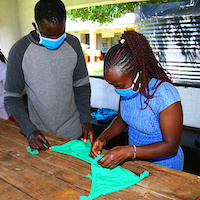Sex education that saves lives
As promised, today’s blog highlights yet another area our July Harambee volunteers have been focusing on in Londiani. Like smokeless stoves and regular handwashing, discussed in previous blogs, this part of their work can have a positive effect on health. The guidance, however, is a little different in this case, as Ned Dwyer explains… “Irresponsible sexual behaviour can lead to an STI/HIV infection – true or false?“ I ask.
Most of the group move towards the side of the building where the word TRUE has been taped to the wall. This is day three of the lifeskills course I am helping to facilitate with a local community health worker, two other volunteers and a staff member of Friends of Londiani (FOL) Kenya. We started on Monday investigating how couples and families can communicate positively and what lies behind people’s value systems. We then moved on to discussing sexual development and what happens during adolescence.
In Kenya, most boys are circumcised at puberty. Until recently many girls were too. Female circumcision is now banned. Nevertheless it still occurs in certain areas, including some communities in the Londiani area. It is for this reason that we explain the dangers of female circumcision, also known as female genital mutilation, and speak of the Alternative Rite of Passage Programme that Friends of Londiani has been introducing across the area.
This programme promotes and supports a community’s celebration of a girl becoming a woman – but without the cutting. On this day, however, we are discussing sexually transmitted diseases and HIV/AIDS, a major killer in Kenya. That’s why we want to let people know how to minimise their exposure to contracting the disease. However, we also want to let them know that, even if it is contracted, life still continues and to show how families and the community can live positively with HIV.
The course is taking place in a simple church building in the community of Kiptenden, a few kilometres outside of Londiani. Pastor Elijah, with the assistance of the village elder Joseph, has encouraged the community to attend. It’s Monday morning and we arrive at 9:30am. We are the first to arrive. As we enter the building I wonder – “Has the community forgotten?” Then I hear “Habari!” – the local greeting – as two women appear through the door. The word has got out that the Land Rover with the course facilitators has arrived.
Over the next half hour many other members of the community appear, welcoming us, shaking our hands and looking forward to the week’s activities. And every day more and more people arrive. By day three there are four to a pew, hanging off the edges, some with babies tied to their backs, and there are young children walking up and down the aisle or playing outside on the grass.
The whole community has come out to learn, putting the daily tasks of weeding the vegetables, preparing the meals and carrying the water on hold. They hope to learn how they can better take control of their family planning, reduce their exposure to sexually transmitted diseases and promote positive mental health, among other topics. Some of those topics can be a bit embarrassing: there is a lot of giggling as each participant learns how to correctly put on a condom using the plastic penises we have brought along. But there is also great curiosity as people realise that such a simple device could save their lives by reducing their risk of exposure to HIV.
In the afternoon, as we enjoy our last cup of chai and pack up our belongings for the journey back to Londiani, I look forward to day four when we will discuss family planning and maternal health, knowing that this will be a week to remember but also, and more importantly, knowing that the information we are helping to deliver could be life changing for this small rural community in western Kenya.

